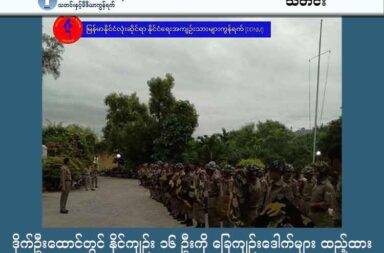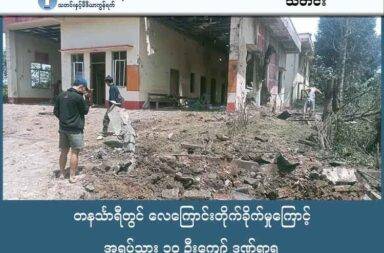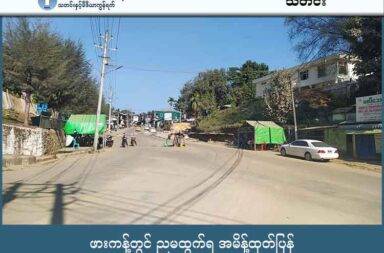Ethnic Leaders See Parallels With Karenni Opposition to Gen Aung San Statue
They say they would rather Aung San’s promises of ethnic equality be honored instead of erecting statues and naming public infrastructure after him.
By NETWORK MEDIA GROUP (NMG)
Thursday, May 16, 2019
Ethnic leaders are calling the Karenni [Kayah] State chief minister’s decision to keep a controversial statue of Gen Aung San detrimental to national reconciliation and trust building in Burma.
On Tuesday, a meeting between the Karenni State government and Karenni youth activists ended abruptly after the state’s chief minister El Phoung Sho said that his administration could not remove a copper statue of the late independence icon, located in the state capital of Loikaw, despite longstanding public demands to do so. He also said that they would “protect” the statue and any memorials to Gen Aung San.
“They have ignored the voices of local ethnic people. In my opinion, federal democracy, ethnic unity and national reconciliation are still very far off,” Dr. Aung Naing Oo, vice chair of the Mon State parliament, told NMG. “Ethnic people have already shown their desires through discussions and demonstrations. [The government] should not ignore it. They should listen to it,” he added.
Karenni State parliamentarian Thae Reh, who was a member of the now-dissolved statue removal coordination committee, said that he doesn’t believe the issue will cease just because the state government has taken this stance, and that the Union government should get involved.
“People here cannot solve this problem—people from the central government should come to solve this problem,” he said. “I don’t see the government compromising. I don’t understand why the government has kept doing this.”
Thae Reh also pointed out that youth activists did not ask for the total removal of the Gen Aung San statue—only its removal from a public area. It is currently located in Loikaw’s Kantaheywon Park, where it is being guarded by security forces and a barbed wire fence.
It is not the first time that commemorations to Aung San have invoked controversy in an ethnic state. The government opened the Gen Aung San Bridge, connecting Mawlamyine and Chaungzon in Mon State in April 2017, even though locals asked that it be called the Salween River Bridge.
“The aims are the same but the implementation is different,” Dr. Aung Naing Oo said of the two projects. “Here in Mon state, they proposed it in the Mon State parliament. Then they forced it to be done. In Kayah State, the Kayah State government is forced to take responsibility.”
The Kachin Democratic Party (KDP) also pointed out that said that National League for Democracy (NLD) government—headed by State Counsellor Daw Aung San Suu Kyi, Gen Aung San’s daughter—has built statues, roads and bridges and then named them after Gen Aung San.
“The NLD party is practicing majoritarianism,” KDP chairperson Gumgrawng Awng Hkam told NMG, referring to what is known in Burma as “Burmanization.”
“They should not do it because the Kayah people don’t accept it. It’s the same in Kachin State. They have never asked for the voice of the Kachin people. They have done whatever they wanted,” the KDP chair said. “I don’t see any good signs for the future. More problems will arise if they continue to ignore the desires of ethnic people.”
The Kachin State government placed a Gen Aung San statue near the clock tower in downtown Myitkyina in February 2017 without local consent. An unidentified group tried to destroy the base of the statue and also vandalized it with paint in July of the same year.
Ethnic leaders said that they would rather Gen Aung San’s promises of ethnic equality be honored as part of his legacy instead of erecting statues and naming public infrastructure after him.
“According to the Panglong Agreement, Burma has become a Union. Signing the Panglong Agreement is not only the desire of the Bamar—it’s because of the desires of all people,” Gumgrawng Awng Hkam said. “Now they are ignoring the Panglong Agreement as well as the ethnic people. The important thing is to implement the promises of the Panglong Agreement. I want to demand that the government stop this kind of action as soon as possible.”
Mon State’s Dr. Aung Naing Oo said his disappointment comes from the fact that he saw himself as having been on “the same democratic side” as the NLD.
“They are only focusing on what they want to do. They ignore the feelings of ethnic people. They don’t respect the symbols of the ethnic people. I think it will impact mutual trust building,” he explained.


